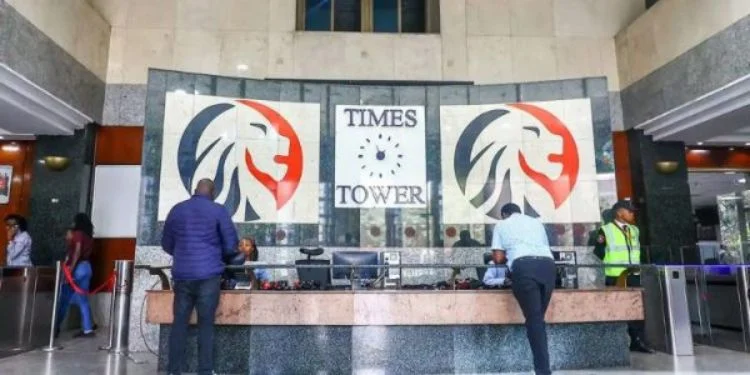What Changed: New Laws Signed in June 2025
On 17 June 2025, President William Ruto signed into law two landmark pieces of legislation aimed at strengthening Kenya’s financial regulation framework:
- The Insurance Professionals Act, 2025, which reforms how insurance practitioners are licensed, regulated, and held accountable.
- The Anti-Money Laundering and Combating of Terrorism Financing (Amendment) Act, 2025, updating Kenya’s legal tools to close gaps in AML/CFT oversight, especially in property, corporate ownership, and financial reporting.
Build the future you deserve. Get started with our top-tier Online courses: ACCA, HESI A2, ATI TEAS 7, HESI EXIT, NCLEX-RN, NCLEX-PN, and Financial Literacy. Let Serrari Ed guide your path to success. Enroll today.
These laws respond to both domestic demands for transparency and external pressures from bodies such as the Financial Action Task Force (FATF) and the European Commission, which had flagged Kenya as having “strategic deficiencies” in its AML/CFT regime.
Key Provisions of the Insurance Professionals Act
The Insurance Professionals Act aims to “professionalise” the insurance industry. Key features include:
- Establishment of a central regulatory body: the Insurance Institute of Kenya (IIK), tasked with oversight, education, professional development, setting ethical codes, and ensuring standards among agents, underwriters, brokers etc. (Insurance Professionals Act 2025)
- Continuous Professional Development (CPD) requirements: All insurance professionals must take part in ongoing training to maintain competence.
- Licensing & registration: Any person engaging in core insurance functions (advising, underwriting, claims, or broking) must hold a valid licence; unlicensed practice may lead to fines, deregistration or criminal sanctions.
- Disciplinary mechanisms: The Act includes provisions for disciplinary committees to investigate misconduct, enforce ethical codes, and penalise violations.
According to commentators, these changes mark a shift from a loosely governed agent-driven insurance environment to one with clear checks and formal standards. (What Kenya’s new Insurance Professionals Act really means)
Highlights of the AML/CFT Amendment Act, 2025
The amendment to Kenya’s Anti-Money Laundering / Countering Financing of Terrorism laws is designed to address deficiencies identified by international assessors. Main enhancements are:
- Enhanced beneficial ownership transparency, making it harder for criminals or shell companies to hide control.
- Stricter requirements for financial institutions and Designated Non-Financial Businesses & Professions (DNFBPs) — which include real estate agents, insurance firms, forex bureaux etc. — to implement enhanced due diligence (EDD), monitor transactions more closely, especially for high-risk clients or large cash movements.
- Expanded authority for enforcement bodies to freeze or seize suspicious assets more rapidly.
- Closer monitoring of property transactions and real estate sector, which previously had weak regulatory oversight.
These reforms form part of Kenya’s response to its grey-listing by FATF in February 2024 and the European Commission’s listing of Kenya in June 2025 as a “high-risk third country” with strategic deficiencies in AML/CFT. (Kenya’s Anti-Money Laundering Amendment Act … high-risk listing)
Why These Laws Are Being Enacted Now
International Pressure & Reputation
- Kenya remains on the FATF grey list, meaning it is under enhanced monitoring due to gaps in its AML/CTF framework. This weakens investor confidence and increases costs of international financial relations. The Amendment Act is explicitly designed to address many of those gaps. (Can amendments get Kenya off FATF’s grey list?)
- On 10 June 2025, the European Commission added Kenya to its list of high-risk AML jurisdictions. Such listings trigger stricter due diligence requirements for EU-based institutions dealing with Kenyan clients. This has reputational and operational consequences. (EU updates high-risk jurisdictions list)
Domestic Need for Better Oversight
- Insurance claims fraud (fake certificates, false motor accidents, impersonation) had been undermining trust and increasing costs for legitimate policyholders. The Insurance Professionals Act is meant to impose minimum competence and ethical behaviour standards.
- Loopholes in real estate, shell companies, and weak beneficial ownership disclosure have long allowed money laundering and corruption to be hidden. The AML/CFT Amendment tightens those areas.
One decision can change your entire career. Take that step with our Online courses in ACCA, HESI A2, ATI TEAS 7, HESI EXIT, NCLEX-RN, NCLEX-PN, and Financial Literacy. Join Serrari Ed and start building your brighter future today.
Impact & What to Expect Going Forward
For Financial Institutions and Insurance Sector
- Insurance firms will need to ensure all professionals (agents, underwriters, brokers etc.) are licensed and engage in CPD. Training and compliance costs may rise, but over time this should reduce fraud, mis-selling, and legal liabilities.
- Banks, insurance companies, forex bureaus, and other DNFBPs will face stricter compliance obligations, especially around transaction monitoring, KYC (Know Your Customer) processes, and reporting suspicious transactions.
- In the real estate sector, more transparency will be required in property transactions; both buyers and persons offering real estate services may need to comply with enhanced ownership and reporting rules.
For Regulatory and Enforcement Bodies
- The Financial Reporting Centre (FRC) of Kenya has been given strengthened powers under the amendment, including broader scope over reporting entities and faster asset seizure/freeze orders.
- Insurance regulation (via the Insurance Regulatory Authority and IIK) will also see stronger roles: licensing, disciplinary actions, and ethical oversight.
- Collaboration between agencies (police, prosecution, judiciary) is expected to intensify to ensure that investigations lead to successful prosecutions.
For Investors, Businesses, and Policyholders
- Improved insurance sector professionalism may restore confidence, potentially reducing fraud-related premium costs over time. Clients can expect greater accountability and transparency.
- For businesses operating internationally, compliance with EU/ FATF norms will be important to maintain access to foreign markets, correspondent banking, trade finance etc. Being in a “high-risk” jurisdiction complicates transactions with foreign banks or partners.
- For policyholders: clearer frameworks should help avoid mis-selling or false claims; there is also potential for better service standards and ethics in the industry.
Remaining Risks & Challenges
- Implementation gap: Laws are only effective if regulatory bodies enforce them. There is concern that political influence or weak resources may slow down enforcement or allow vested interests to evade compliance.
- Capacity constraints: Both in regulatory authorities and law enforcement. For example, ability to process large volume of suspicious transaction reports, investigate, litigate etc.
- Balancing transparency with privacy: Especially around beneficial ownership and real estate. There may be pushback from some sectors.
- Risk of over-regulation costs: Small insurance agencies or brokers could find compliance burdensome if requirements are high without proportional support.
- Continued perception risk: Even with laws passed, external bodies (FATF, EU) will be watching actions not just statutes. Successful prosecutions, visible enforcement, and systemic change are needed to improve rating or be removed from high-risk listings.
Verified Data & Supporting Research
- The Insurance Professionals Act, 2025 establishes two key bodies: the Insurance Institute of Kenya (IIK) and the Insurance Professionals Examinations Board. These will oversee examinations, licensing, registration, and disciplinary oversight. (Insurance Professionals Act details)
- According to legislative texts, the Act mandates a code of ethics, continuous professional development, and the ability to deregister or impose fines or criminal charges for serious misconduct. (Kenya Law Reports: Insurance Professionals Act)
- On AML/CFT, the Act was passed in response to FATF’s Mutual Evaluation Report and aligns critical statutes like the Proceeds of Crime & Anti-Money Laundering Act, Prevention of Terrorism Act etc., filling many legal gaps. (Kenya’s AML Amendment Act summary)
- Kenya’s listing by the European Commission among high-risk third countries came with obligations for increased due diligence in cross-border and institutional transactions. (EU high-risk listing Kenya)
- The Protections for Non-Profit Organisations (NPOs) sector was noted by FATF as poorly regulated; the amendment law is expected to enable regulation in that space to mitigate terrorism financing risk. (Can amendments get Kenya off FATF’s grey list?)
What These Changes Mean for Kenya’s Global Standing
- Passage of these laws is a required step if Kenya hopes to exit the FATF grey list. Visible progress metrics will include prosecution of money laundering and terrorism financing cases, more robust beneficial ownership registries, real estate sector transparency, and regulatory enforcement.
- These statutes may help restore trust among foreign investors and financial institutions, potentially easing access to finance, investment, and trade.
- For insurance industry practitioners, aligning with global standards may open up partnership or reinsurance opportunities abroad.
Timeline & Next Steps
| Milestone | What Should Happen |
| Immediately following passage | Regulatory bodies develop detailed regulations, codes of ethics, CPD curricula, licensing guidelines. |
| Mid-term (6-12 months) | Enforcement begins: disciplinary hearings, registrations audits; reporting institutions adapt to enhanced due diligence protocols. |
| 1-2 years | Evaluate whether Kenya has addressed the FATF/ESAAMLG recommendations; aim for removal of grey listing. |
| Continuous | Monitoring and public reporting on property transactions, beneficial ownership, case prosecutions, transparency in ownership structures. |
Conclusion
By enacting the Insurance Professionals Act and the strengthened AML/CFT Amendment Act, Kenya has taken steps to shake up both the insurance sector’s accountability and the broader financial system’s integrity. These reforms are crucial not only for domestic trust — between policyholders, insurers, and agents — but for Kenya’s international reputation in finance, investment, and regulatory compliance.
The laws themselves are important, but the true test lies in implementation. If Kenya can demonstrate credible enforcement, transparency, and measurable results — in licensing, in asset seizure, in fraud prosecution — then these reforms could mark turning points: reducing illicit financial flows, reducing costs borne by ordinary citizens, and re-anchoring Kenya’s place among responsible jurisdictions in global financial markets.
Ready to take your career to the next level? Join our Online courses: ACCA, HESI A2, ATI TEAS 7 , HESI EXIT , NCLEX – RN and NCLEX – PN, Financial Literacy!🌟 Dive into a world of opportunities and empower yourself for success. Explore more at Serrari Ed and start your exciting journey today! ✨
Track GDP, Inflation and Central Bank rates for top African markets with Serrari’s comparator tool.
See today’s Treasury bonds and Money market funds movement across financial service providers in Kenya, using Serrari’s comparator tools.
Photo source: Google
By: Montel Kamau
Serrari Financial Analyst
17th June, 2025
Article, Financial and News Disclaimer
The Value of a Financial Advisor
While this article offers valuable insights, it is essential to recognize that personal finance can be highly complex and unique to each individual. A financial advisor provides professional expertise and personalized guidance to help you make well-informed decisions tailored to your specific circumstances and goals.
Beyond offering knowledge, a financial advisor serves as a trusted partner to help you stay disciplined, avoid common pitfalls, and remain focused on your long-term objectives. Their perspective and experience can complement your own efforts, enhancing your financial well-being and ensuring a more confident approach to managing your finances.
Disclaimer: This article is for informational purposes only and does not constitute financial advice. Readers are encouraged to consult a licensed financial advisor to obtain guidance specific to their financial situation.
Article and News Disclaimer
The information provided on www.serrarigroup.com is for general informational purposes only. While we strive to keep the information up to date and accurate, we make no representations or warranties of any kind, express or implied, about the completeness, accuracy, reliability, suitability, or availability with respect to the website or the information, products, services, or related graphics contained on the website for any purpose. Any reliance you place on such information is therefore strictly at your own risk.
www.serrarigroup.com is not responsible for any errors or omissions, or for the results obtained from the use of this information. All information on the website is provided on an as-is basis, with no guarantee of completeness, accuracy, timeliness, or of the results obtained from the use of this information, and without warranty of any kind, express or implied, including but not limited to warranties of performance, merchantability, and fitness for a particular purpose.
In no event will www.serrarigroup.com be liable to you or anyone else for any decision made or action taken in reliance on the information provided on the website or for any consequential, special, or similar damages, even if advised of the possibility of such damages.
The articles, news, and information presented on www.serrarigroup.com reflect the opinions of the respective authors and contributors and do not necessarily represent the views of the website or its management. Any views or opinions expressed are solely those of the individual authors and do not represent the website's views or opinions as a whole.
The content on www.serrarigroup.com may include links to external websites, which are provided for convenience and informational purposes only. We have no control over the nature, content, and availability of those sites. The inclusion of any links does not necessarily imply a recommendation or endorsement of the views expressed within them.
Every effort is made to keep the website up and running smoothly. However, www.serrarigroup.com takes no responsibility for, and will not be liable for, the website being temporarily unavailable due to technical issues beyond our control.
Please note that laws, regulations, and information can change rapidly, and we advise you to conduct further research and seek professional advice when necessary.
By using www.serrarigroup.com, you agree to this disclaimer and its terms. If you do not agree with this disclaimer, please do not use the website.
www.serrarigroup.com, reserves the right to update, modify, or remove any part of this disclaimer without prior notice. It is your responsibility to review this disclaimer periodically for changes.
Serrari Group 2025
















